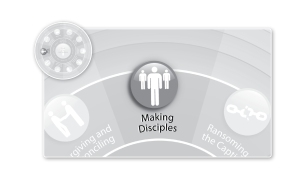Part IV of our series on Making Disciples
 Jesus is getting ready to ascend into heaven. After three years, a death, a resurrection, and forty days of appearances he has raised up a tiny but fully discipled band.
Jesus is getting ready to ascend into heaven. After three years, a death, a resurrection, and forty days of appearances he has raised up a tiny but fully discipled band.
Now, in Matthew 28:16-20 Jesus is dispatching them to disciple the entire world. So what are his final words to them? They’re surprisingly unsentimental. He doesn’t talk about faithfulness or perseverance or belief.
Instead, he speaks about discipleship.
Then the eleven disciples went to Galilee, to the mountain where Jesus had told them to go. When they saw him, they worshiped him; but some doubted. Then Jesus came to them and said, “All authority in heaven and on earth has been given to me. Therefore go and make disciples of all nations, baptizing them in the name of the Father and of the Son and of the Holy Spirit, and teaching them to obey everything I have commanded you. And surely I am with you always, to the very end of the age.”
“Obey everything” is a really interesting phrase. I like what discipleship specialist Jeremy Pryor writes about that. He says:
“Obey everything I have commanded you” means discipleship must be comprehensive. Most people ignore this line with a sigh and saying to themselves, “See, it’s impossible.” We have an enlightenment definition of comprehensive knowledge but I think both Jesus and the disciples thought this was entirely possible, maybe in a 1–2 year process. Paul says to the Ephesian elders after 2 years, “I didn’t shrink from declaring all that God wants you to know” (Acts 20:27). So we move on to part 27 in our 49 part series through the book of Luke not considering that we are actually responsible to train each disciple in our care to obey “everything.” This requires an aggressive, comprehensive, systematic plan for discipleship.
That’s the .W model.
And a big part of that model is that we can only pour into others what we are fully aware of having received personally from Christ.
Thus, we are not teaching only information.
We are, instead, pouring out a lifetime of experience—or, more appropriately, personal gifts received from Christ. We can disciple a student to share bread because Christ has shared his bread with us. We can disciple a student to heal and comfort because we have personally experienced the healing and comfort of Christ.
You can see this in the life of the apostle Paul. Christ has emptied himself into Paul, and Paul is deeply aware of this. He writes in Philippians 2 that Christ emptied himself and took on the form of a servant. Now, as the end of Paul’s own life approaches, he draws on the same language of self-emptying, in a personal note to his disciple Timothy. Paul writes in 2 Timothy 4:5-8:
But you, keep your head in all situations, endure hardship, do the work of an evangelist, discharge all the duties of your ministry.
For I am already being poured out like a drink offering, and the time has come for my departure. I have fought the good fight, I have finished the race, I have kept the faith. Now there is in store for me the crown of righteousness, which the Lord, the righteous Judge, will award to me on that day—and not only to me, but also to all who have longed for his appearing.
On the last day, the question of the Lord for each teacher will not only be, “Did you teach them to obey everything I commanded?” but rather, “Did you teach them how to receive all the grace that I poured into you?”
How would you answer that question? What is your strategy for teaching others to receive the same grace God poured into you?











Pingback: Prayer: The Neglected Area of Discipleship | Rev. Eric Foley
Pingback: The Difference Between Discipleship and Therapy | Rev. Eric Foley
I love your aticle and I would love to be recieving it via Email thanks and God bless
Thanks for reading and commenting. On the front page of dotheword.org, on the right hand side there is a small box that you can enter your e-mail address. After you’ve entered your e-mail address just click the “follow” button and you should be all set. God Bless